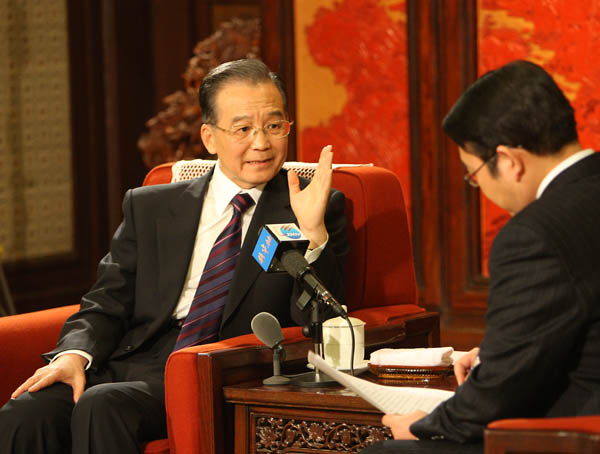| Videos | ? Latest |
|
? Feature | ? Sports | ? Your Videos |
Premier Wen: stimulus package effective, room for improvement
TOO EARLY TO GRADE PERFORMANCE
While China's economy began to recover, Wen said it was too early to grade economic performance as the financial crisis was not over yet and much more work was required.
Citing credit growth as an example, Wen admitted China might need to "pay some price and run into some unexpected difficulties" In tackling the global financial crisis.
"It could have been better if our bank lending had been more balanced, better structured and not on such a large scale," he said.
The moderately loose monetary policy, which the government adopted in November last year, spurred the surge in new lending.
In the first 11 months of this year, new loans hit 9.21 trillion yuan, an increase of 5.06 trillion yuan year on year, far exceeding the full year target of 5 trillion yuan the government set in March.
Wen said the State Council had noticed the problem in the middle of the year and moved to correct it. "It has been improving in the second half."
Credit expansion was one of the "unexpected difficulties" China had encountered in dealing with the worst crisis in decades, Wen said.
The State Council had to learn from past experience, detect problems and make persistent efforts to fight the crisis effectively, he said.
He admitted the State Council had time in the second half of the year to calmly reflect on the problems arising from the emergency response to the economic crisis.
CONCERNS OVER RISING HOUSE PRICES
Wen said he had noticed the criticism of Chinese Internet users of soaring property prices, and pledged to crack down on illegal activities that inflated prices. He also promised another chat with netizens ahead of the annual Parliament session in March next year.
"As the property market is recovering rapidly this year, housing prices in some cities are rising too fast, which deserves 'great attention' of the central government," he said.
"We will crack down on illegal moves, including hoarding of land and delaying sales for bigger profits," he said.
Wen's comments echoed repeated government calls to curb speculation as housing prices in major Chinese cities rose 5.7 percent year-on-year in November, fueled by growing demand, speculative deals and easy credit.
Wen said the government's tools in stabilizing prices were taxes, interest rates and land policies.
He said the government would expand construction of affordable housing projects for low-income families and speed up the renovation of "shanty towns", providing preferential funding, land and tax policies.
Wen said the government would increase supply of smaller medium and low price homes, continue to support home buyers, and curb speculation to allow the healthy development of the real estate sector.
Statistics from Goldman Sachs showed that over the past six years, the housing price hikes had outpaced income rises by 30 percentage points in Shanghai and 80 percentage points in Beijing.
In Beijing, the housing price per square meter is seven times the average monthly salary.
The soaring home prices had prompted fears that a property bubble was forming. The central government was taking measures to deflate the bubble.

 0 Comments
0 Comments







